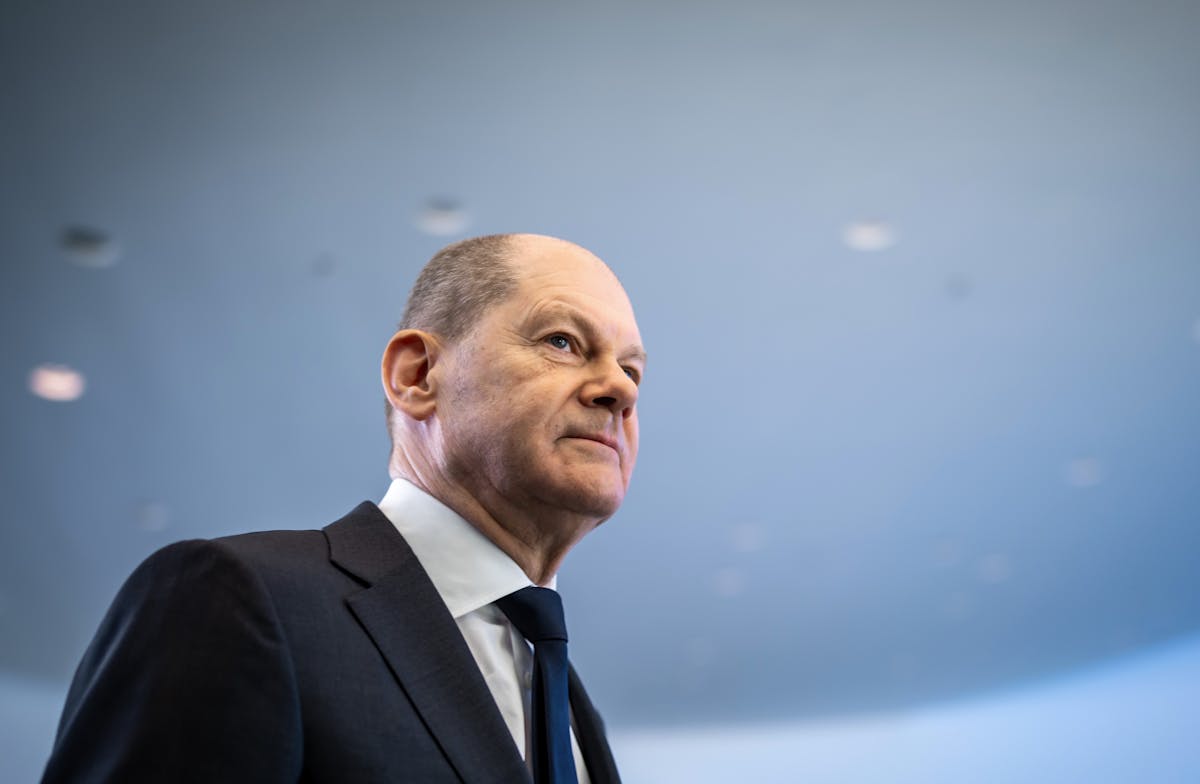As Russian Troops Roll Toward Kyiv, German Leaders Lament Political, Military Helplessness
The German army ‘is more or less bare,’ a general wrote, adding that ‘the options that we can offer politicians to support’ the NATO alliance ‘are extremely limited.’

As a Russian offensive penetrates more deeply into Ukraine, some of Germany’s top officials bemoan their country’s unpreparedness for this conflict, criticizing what they describe as a deep apathy and propensity for inaction.
In a startling admission, a top German general said on Thursday that the German Bundeswehr would be virtually powerless to help North Atlantic Treaty Organization allies support the alliance’s eastern flank.
In a statement posted to Lieutenant General Alfons Mais’s LinkedIn profile, the soldier seemed incredulous, stating he would not have believed in his “41st year of peacetime service that I would have to experience another war.”
Although “privileged to lead” the Bundeswehr, the German army “is more or less bare,” the general explained, adding that “the options that we can offer politicians to support” the NATO alliance “are extremely limited.”
“We all saw it coming and were not able to get through with our arguments, to draw the conclusions from the Crimean annexation and implement them. This does not feel good! I am pissed off!”
A former German defense minister, Annegret Kramp-Karrenbauer, largely concurred. She took to Twitter to vent her frustration at her country’s leadership, which she holds in abeyance.
“I am so angry at us because we have failed historically,” she typed. “We have not prepared anything after Georgia, Crimea, and Donbass that would have really deterred” President Putin.
Although the German foreign minister, Annalena Baerbock, took a hard line against Russia in a televised address this morning after Russia began its offensive, German messaging on the issue leading up to the conflict has been mixed.
It was just two days ago, after weeks of vague statements, that Chancellor Scholz recommended Germany ditch Nord Stream 2, the Russian-backed gas pipeline that critics say makes Germany overly reliant on imported Russian gas.
Germany has also sustained criticism from allies. Berlin staunchly refuses to export weapons to Ukraine, a policy that is broadly out of step with most other NATO allies. Berlin opted instead to send helmets and a medical facility to Kyiv — equipment that may never actually reach Ukraine.
While German leadership appeared to waffle on the Ukraine issue, other European heads of industry have scrambled to divest themselves of their Russia connections and avoid the appearance of sympathy toward that country.
A raft of prominent European politicians resigned from their posts as board members of several of Russia’s most significant companies following Moscow’s multifront invasion of Ukraine on Thursday, the Financial Times reports.
The list included a Finnish prime minister who served in the early 1990s, Esko Aho; Italy’s Matteo Renzi, prime minister from 2014 to 2016, and Austria’s Christian Kern, who served as chancellor for part of 2016 and 2017.
The politicians cited potential conflicts of interest, personal reasons, and company involvement with the Russian military as reasons for their departure, seeking to distance themselves from Russia and keep in step with widespread solidarity for Ukraine in Europe.
Consciously absent from the list, however, is Gerhard Schröder, German chancellor from 1998 to 2005 and current member of the board at Gazprom, the Russian state-owned gas conglomerate behind the recently halted Nord Stream 2 project.
Both Herren Scholz and Schröder hail from the center-left Social Democrat party, a connection that has proved problematic, leaving their political camp with divergent lines of messaging.
In addition to his chummy and very public friendship with President Putin post-chancellorship, Herr Schröder has made several controversial statements in the German press, accusing Kyiv of “saber-rattling” and stoking tensions with Russia.
Although German public opinion is firmly against exporting weaponry to Ukraine, the mood in Berlin today was palpably supportive of the country, with thousands of demonstrators bedecked in the yellow and blue of the Ukrainian flag gathering on Thursday evening at the Brandenburg Gate, a prominent monument and one of the capital city’s focal points.
Slogans and chants of “Putin raus,” or “Putin leave,” and “Slava Ukraini,” or “Glory to Ukraine,” were heard, and one handmade placard drew this reporter’s particular attention.
“You have f— up with the sanctions,” it read in bold red lettering. “Don’t f– up now.”

